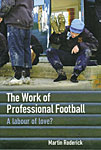 A Labour Of Love?
A Labour Of Love?
by Martin Roderick
Routledge, £22.99
Reviewed by Joyce Woolridge
From WSC 244 June 2007
In the mid-1990s, Martin Roderick was diagnosed with Hodgkin’s lymphoma. It spelled the end of his professional football career, but also explained why he had suffered pain and exhaustion for several years. His managers and club doctors had already decided why he was so tired. He was a lightweight, a “big time Charlie” who didn’t like playing in the lower divisions. Their solutions: various forms of verbal bullying and a couple of ibuprofen. Since leaving football, he has pursued an academic career and written a thesis based on anonymous interviews with nearly 50 professionals, as well club doctors, physios and a few agents, which explores football as work.
His conclusions are striking. While most football fans consider the job of a professional footballer as almost a vocation, for the journeyman player (the bulk of those interviewed here), it seems anything but. According to Roderick, the systems which exist within professional football create a corrosive cynicism among players which is both a form of resistance to its brutalities, as well as a response to being treated like a commodity.
Roderick’s interviews reveal professional football to be dominated by “authoritarianism, ruthlessness and hyper-masculine workplace practices”. Young players learn early to show that they “want it”, but that can involve the nonsensical – how to adopt a stance which demonstrates that you are a “tough, hard bastard” – as well as a more dangerous subservience. Players conceal serious injuries or are asked to play when they are in pain. Some managers illogically adore players who play through an injury, even though it may put them out for weeks longer than it would have done if rested. Foreign players who come from a more sensible culture about injury are dismissed as work-shy or effeminate.
The chapters on injury are some of the most compelling. Once again the macho attitudes of British football conspire to make rehabilitation as difficult as possible. Managers and physios often refuse to believe there is anything physically wrong, unless it can be shown up as a wound, on a scan or in an x-ray. The injured player becomes the butt of other players’ jokes, rarely visited or phoned. The result, in tandem with the player’s own anxieties about their recovery and future career, is “depression, isolation and loneliness”, all hardly conducive towards a speedy recovery.
This is an academic work, so along with the frank but anonymous comments by the participants, there is plenty of supporting methodology, which the layperson might find stimulating or tedious, though some of the jargon is highly entertaining. “Banana time”, meaning necessary interludes of horseplay and lunacy, has now entered my everyday vocabulary. Above all, the book goes a long way to explaining why British football likes its footballers stupid and encourages them to behave accordingly. As a top player once half-jokingly said when asked his opinion, “Don’t ask me what I think. They’ve been trying to knock that out of me for years.”